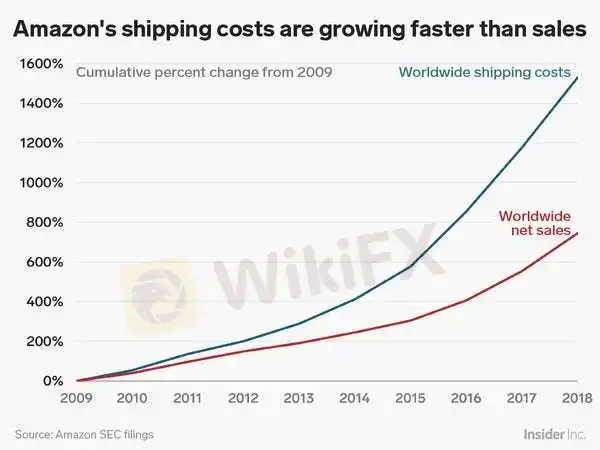简体中文
繁體中文
English
Pусский
日本語
ภาษาไทย
Tiếng Việt
Bahasa Indonesia
Español
हिन्दी
Filippiiniläinen
Français
Deutsch
Português
Türkçe
한국어
العربية
Timeline of Amazon's logistics growth as it looks to test UPS, FedEx - Business Insider
Abstract:Amazon quietly became a logistics giant in the 2010s. And its network won't just move your Prime packages in 2020s.
Amazon quietly became a logistics giant in the 2010s.And its network of planes, trains, ships, vans, and trucks aren't just for moving your Prime packages.Increasingly, industry watchers say Amazon's burgeoning logistics network will soon compete with FedEx and UPS. Leadership of FedEx and UPS, the two package delivery mainstays, had long rejected that Amazon is a threat. Now, they're admitting that Amazon is indeed a competitor. Here's a decade look back at how Amazon became a transportation giant this year. Click here for more BI Prime stories.Amazon has fueled the world's demand for free, fast shipping. But free shipping has ended up being pretty expensive for Amazon itself. Amazon's worldwide shipping costs grew fifteenfold from 2009 to 2018. Meanwhile, net sales have increased sevenfold.That's motivated the tech-retail-media-advertising-and-so-on giant to add another industry it's vying to disrupt: logistics. “Amazon has built a global end-to-end logistics network that comprises of their own internal last-mile network, their own trucks, their own trains, their own planes, their own truck brokerage, and their own air and ocean freight forwarding,” Morgan Stanley analyst Ravi Shanker told Business Insider in 2019.

SEC filings; Andy Kiersz/Business Insider
Amazon leadership has told investors that its interest in logistics is to slash those costs and give customers a better experience. But industry watchers say Amazon's goals lie elsewhere — in disrupting UPS and FedEx. Amazon did not provide a comment for this article. There's serious money in moving packages. UPS grossed nearly $72 billion in 2018, while FedEx brought in more than $65 billion in revenue. And that doesn't even total in the hundreds of billions that the trucking, rail, ocean freight, and air cargo industries are worth.Meanwhile, the leaders in logistics are increasingly seeing the company as a competitor, not just a customer.“UPS continues to provide innovative solutions to all of our customers to help them grow and succeed,” a UPS spokesperson told Business Insider. “Amazon is a good customer with whom we maintain a mutually beneficial relationship.”There is more to e-commerce than Amazon,“ he added. ”UPS is creating innovative products and partnering with other companies to offer a suite of solutions to serve small, medium and large e-tailers around the world. Our customer base is diverse and we provide services to many of these customers across our entire portfolio.

Rakuten Intelligence; Andy Kiersz/Business Insider
Meanwhile, FedEx severed its Amazon business in its US air and ground network this year — signalling an interest in capturing all non-Amazon e-ecommerce. “FedEx is focused on serving the addressable $550 billion global transportation and logistics market,” a FedEx spokesperson told Business Insider. “Within that market, there is significant demand and opportunity for growth in e-commerce, which is expected to grow from 50 million to 100 million packages a day in the US by 2026.”FedEx has already built out the network and capacity to serve thousands of retailers in the e-commerce space,“ he added. ”We are partnering with major retailers to support their growth through our best-in-class portfolio of innovative solutions, such as FedEx Extra Hours, the launch of seven-day deliveries via FedEx Ground and our FedEx retail convenience network.Amazon's growth into a logistics company didn't happen overnight, so Business Insider created a timeline tracking how and why Amazon has moved into the transportation industries. Here's what happened:
Disclaimer:
The views in this article only represent the author's personal views, and do not constitute investment advice on this platform. This platform does not guarantee the accuracy, completeness and timeliness of the information in the article, and will not be liable for any loss caused by the use of or reliance on the information in the article.
Read more

PayPal profit beats estimates, U.S. Venmo users can pay on Amazon from next year
PayPal Holdings Inc beat Wall Street estimates for quarterly profit and said U.S. users of its peer-to-peer payment service Venmo would be able to pay on Amazon.com starting next year.
12 people who seemingly predicted the coronavirus pandemic - Business Insider
Bill Gates warned Donald Trump before he took office of the dangers of a pandemic — and urged him to prioritize the US' preparedness efforts.

US jobless claims preview: Economists expect another week of decline - Business Insider
"If the current rate of decline continues, claims will dip below 1M in the second or—more likely—third week of June," said economist Ian Shepherdson.
Tough truths about starting a business, from ban.do founder Jen Gotch - Business Insider
Jen Gotch, founder of accessories and stationery brand ban.do, said sometimes the best thing you can do is just say yes and figure it out later.
WikiFX Broker
Latest News
Ghana Trader Jailed for $300K Forex and Crypto Scam
US Dollar Surge Dominates Forex Market
Hong Kong Police Bust Deepfake Crypto Scam Syndicate Involving $34 Million
Is it a good time to buy Korean Won with the current depreciation?
Pepperstone Sponsored the "Aston Martin Aramco Formula One Team"
ACY Securities Integrates MetaTrader 5 to Enhnace Copy Trading Service
Soegee Futures Review: Should You Trust This Broker?
Malaysian Pilot Loses RM1.36 Million in UVKXE Investment App Scam
Indonesia officially joins the BRICS countries
Attention! Goldman Sachs Cuts Gold Target to $2910
Currency Calculator







